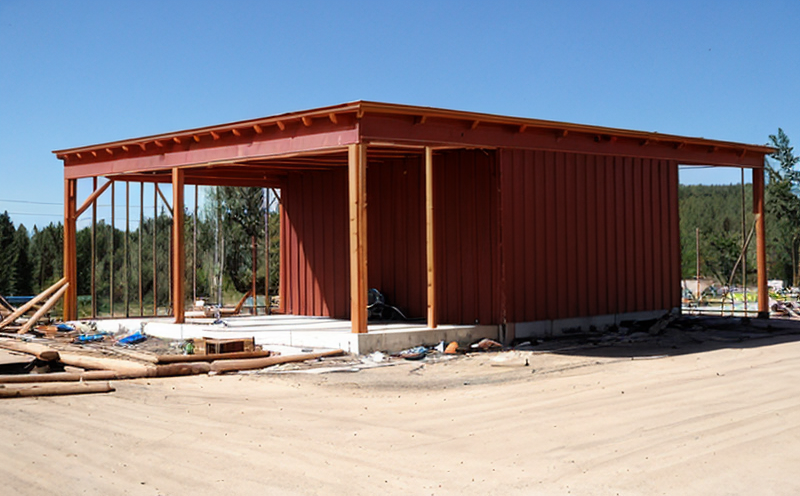ISO 3452-5 Penetrant Testing of Aerospace Welds
The ISO 3452-5 standard provides a comprehensive approach to assessing structural integrity through penetrant testing, specifically for aerospace welds. This service ensures that critical joints in aircraft components meet the highest quality and safety standards.
Aerospace welding presents unique challenges due to stringent requirements for reliability and performance. Penetrant testing is an essential non-destructive testing (NDT) method used to detect surface-breaking flaws, ensuring the integrity of welded joints. This method involves applying a penetrant material that seeps into any open surface discontinuities in the weld. After drying, a developer is applied to draw out the penetrant from these defects and make them visible for analysis.
Our service adheres strictly to ISO 3452-5 guidelines, which specify the use of specific materials and techniques tailored to aerospace applications. The standard ensures consistent results across different testing environments and operators, providing reliable and repeatable data.
The process begins with thorough specimen preparation. This involves cleaning the weld surfaces to remove contaminants that could interfere with penetrant detection. Proper surface treatment is crucial for accurate inspection outcomes. Subsequent steps include applying the penetrant, allowing it to penetrate into any defects, drying, developing, and finally, examining the results using appropriate lighting.
Our highly skilled technicians use advanced equipment such as ultraviolet (UV) lamps or dye penetrants to enhance defect visibility. The use of these tools ensures accurate detection even in areas with complex geometries or small defect sizes. Reporting is conducted meticulously, capturing detailed information about each inspection, including the type and location of defects, their size, and severity.
The ISO 3452-5 standard also emphasizes the importance of training for personnel performing these tests. This ensures that all involved parties are well-prepared to handle the intricacies of aerospace welding inspections. Regular calibration and validation of testing equipment further enhance reliability and accuracy.
By adhering strictly to this international standard, we provide a robust framework ensuring that every weld is thoroughly inspected, thereby contributing significantly to overall safety in aviation industries.
Why It Matters
The aerospace industry relies heavily on materials that can withstand extreme conditions and stresses. Welds form critical components of aircraft structures, where any defect could lead to catastrophic failure. Penetrant testing is a cornerstone of quality assurance in this sector.
- Enhanced Safety: Detecting surface-breaking flaws early helps prevent accidents caused by structural failures.
- Cost Efficiency: Preventive measures reduce the need for costly repairs and replacements later in the aircraft's lifecycle.
- Regulatory Compliance: Adherence to ISO standards ensures compliance with international regulations, maintaining a competitive edge in global markets.
The reliability of penetrant testing is crucial as it forms part of an integrated quality assurance program. This not only meets industry expectations but also builds trust among stakeholders and customers.
In summary, ISO 3452-5 penetrant testing plays a vital role in maintaining the highest standards of safety and performance in aerospace welding processes.
Environmental and Sustainability Contributions
The use of advanced non-destructive testing methods like penetrant inspection contributes positively to environmental sustainability. By ensuring that each weld meets stringent quality criteria, we reduce the likelihood of premature failures requiring rework or replacement. This minimizes material waste and extends the operational life of aircraft components.
Our commitment to precision in aerospace welding inspections also supports broader sustainable practices within manufacturing processes. Efficient use of resources and reduced downtime enhance overall operational efficiency, contributing to lower carbon footprints throughout the supply chain.
In addition, by providing reliable data that can inform design improvements or process optimizations, we help drive innovation towards more durable and efficient aircraft structures. This proactive approach supports long-term sustainability goals across the aviation industry.
Competitive Advantage and Market Impact
Adhering to ISO 3452-5 significantly enhances our competitive position in the global market by offering a robust framework that ensures consistent quality. This consistency translates into enhanced trust among stakeholders, including customers and regulatory bodies.
- Enhanced Reputation: Our commitment to high-quality testing methods strengthens our reputation as a reliable partner in aerospace manufacturing.
- Innovation Support: By providing detailed and accurate inspection data, we support continuous improvement initiatives that drive innovation across the industry.
- Global Reach: Compliance with international standards opens doors to new markets and opportunities for collaboration with leading companies worldwide.
The market impact of this service extends beyond immediate clients. By setting benchmarks in aerospace welding inspections, we influence best practices and contribute to overall advancements in the industry.





